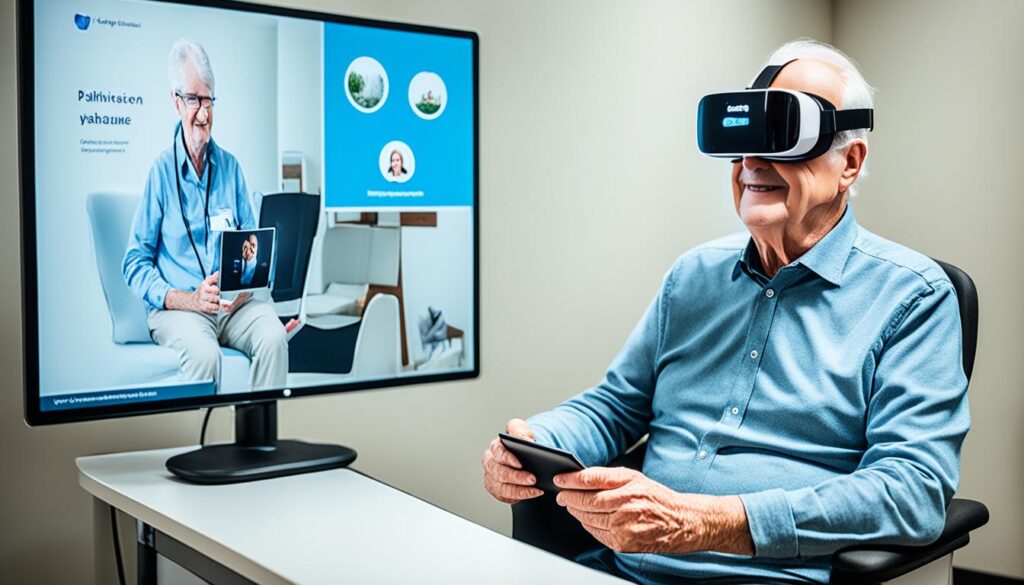Are you aware that palliative care can greatly enhance the quality of life for individuals fighting Parkinson’s disease? Although Parkinson’s disease mainly impacts the elderly, the advantages of palliative care in handling its symptoms and addressing the unique challenges experienced by those with the disease are frequently underestimated.
In later stages of the disease, when conventional treatment options become less effective, palliative care provides comfort, support, and comprehensive management to enhance the overall well-being of individuals with Parkinson’s disease. By focusing on physical, psychological, and social aspects, palliative care aims to optimize symptom control, improve emotional well-being, and promote independence.
Join us as we delve into the hidden benefits of palliative care in Parkinson’s disease and explore how it can provide holistic support for patients and their caregivers.
Key Takeaways:
- Palliative care plays a crucial role in improving the quality of life for individuals with Parkinson’s disease.
- It focuses on providing comfort, support, and comprehensive management for end-stage Parkinson’s disease patients.
- Palliative care addresses both motor and non-motor symptoms, enhancing overall well-being.
- A multidisciplinary approach ensures comprehensive care for individuals with Parkinson’s disease.
- Caregiver support is an essential component of palliative care in Parkinson’s disease.
The Need for Palliative Care in Parkinson’s Disease
Parkinson’s disease is a progressive condition that has a significant impact on the physical, cognitive, and emotional well-being of patients. As the disease advances, traditional medical interventions become less effective, leading to motor complications and non-motor symptoms. In order to address these challenges and provide support for Parkinson’s disease patients, palliative care plays a crucial role in managing their symptoms, maintaining independence, and improving overall quality of life.
Unlike traditional treatment approaches that primarily focus on symptom relief and motor function enhancement, palliative care offers a more comprehensive approach to Parkinson’s disease management. It addresses the specific needs of patients in advanced stages of the disease, providing holistic care that encompasses physical, psychological, and emotional support.
In the later stages of Parkinson’s disease, patients often experience motor complications such as tremors, rigidity, and difficulties with movement. These complications can significantly impact their ability to perform daily activities and maintain independence. Palliative care interventions aim to minimize motor complications, maximize periods of symptom relief, and promote optimal motor function.
Furthermore, Parkinson’s disease is not just limited to motor symptoms. It is associated with a wide range of non-motor symptoms such as cognitive changes, mood disorders, sleep disturbances, and autonomic dysfunction. Palliative care recognizes and addresses these non-motor symptoms, improving the overall well-being and quality of life for patients.
Through the integration of palliative care into Parkinson’s disease management, patients receive comprehensive support tailored to their unique needs. By working closely with a multidisciplinary team of healthcare professionals, patients can benefit from personalized care plans that optimize symptom control, improve comfort, and enhance their overall well-being.
“Palliative care becomes essential to address the challenges of Parkinson’s disease and support patients in managing their symptoms, maintaining independence, and improving their overall quality of life.
By providing tailored interventions and support, palliative care allows Parkinson’s disease patients to have a better understanding of their condition, cope with their symptoms effectively, and make informed decisions about their care. It empowers patients to actively participate in their treatment and ensures that their physical, emotional, and social needs are met.
Next, we will discuss how palliative care specifically enhances the quality of life for individuals living with Parkinson’s disease and the various interventions used to manage both motor and non-motor symptoms.
The Role of Palliative Care in Parkinson’s Disease Management
| Benefits of Palliative Care in Parkinson’s Disease | Interventions Provided |
|---|---|
| Improved symptom management | Individualized pharmacologic and non-pharmacologic approaches |
| Enhanced emotional well-being | Psychological support, counseling, and access to support groups |
| Increased independence and quality of life | Motor complication management, assistance with activities of daily living |
| Comprehensive care coordination | Collaboration with a multidisciplinary team of healthcare professionals |
In the next section, we will delve into the specific ways palliative care enhances the quality of life for individuals living with Parkinson’s disease.
Enhancing Quality of Life through Palliative Care
Palliative care in Parkinson’s disease goes beyond just managing symptoms; it aims to improve the overall quality of life for patients. Through a comprehensive approach, a multidisciplinary team provides physical, psychological, social, and spiritual support, addressing both motor and non-motor symptoms. By prioritizing patient comfort and well-being, palliative care strives to enhance the overall experience for individuals living with Parkinson’s disease.

Improving quality of life is a key focus of palliative care in Parkinson’s disease. It involves addressing the physical symptoms such as tremors, rigidity, and bradykinesia through appropriate medical interventions. Additionally, comprehensive care considers the non-motor symptoms, such as cognitive changes, mood disorders, and sleep disturbances, which significantly impact a patient’s well-being.
A multidisciplinary team consisting of neurologists, nurses, physiotherapists, occupational therapists, social workers, and psychologists collaborates to provide holistic care that caters to the unique needs of each patient. This approach ensures that all aspects of a patient’s life are considered, empowering them to live their best and most fulfilled lives.
Furthermore, social and emotional support is an essential part of palliative care for Parkinson’s disease. Patients and their families may experience emotional distress, anxiety, and depression due to the challenges and uncertainties associated with the disease. Palliative care professionals offer counseling, facilitate access to support groups, and provide resources to help patients and their loved ones navigate the emotional toll of the condition.
“Palliative care professionals focus on enhancing the overall well-being of individuals living with Parkinson’s disease by prioritizing comfort and providing comprehensive support.”
By addressing the physical, emotional, and social aspects of Parkinson’s disease, palliative care strives to enhance the quality of life for patients. It empowers individuals to effectively manage their symptoms, maintain their independence, and find joy in everyday life. With a multidisciplinary and patient-centered approach, comprehensive palliative care ensures that individuals with Parkinson’s disease receive the support and care they need to live their lives to the fullest.
Palliative Care Management Options for Parkinson’s Disease
Palliative care management options for Parkinson’s disease encompass a range of interventions tailored to the individual patient’s needs. Our goal is to optimize symptom control, improve patient comfort, and enhance overall well-being.
Pharmacologic Approaches
Pharmacologic interventions play a crucial role in managing motor symptoms and complications associated with Parkinson’s disease. These medications aim to alleviate tremors, rigidity, and bradykinesia, improving mobility and motor function.
| Medication | Benefits | Possible Side Effects |
|---|---|---|
| Levodopa | Significantly improves motor symptoms | Dyskinesias, nausea, hallucinations |
| Dopamine agonists | Reduces motor fluctuations and dyskinesias | Nausea, edema, sleep disturbances |
| COMT inhibitors | Prolongs the effects of levodopa | Nausea, diarrhea, dyskinesias |
Non-pharmacologic Interventions
Non-pharmacologic interventions are vital in managing the non-motor symptoms of Parkinson’s disease. These approaches focus on improving overall well-being, addressing emotional distress, and promoting independence.
- Physical therapy: Helps improve mobility, balance, and strength.
- Occupational therapy: Assists in enhancing daily activities and promoting independence.
- Speech therapy: Targets speech and swallowing difficulties.
- Nutritional counseling: Supports a balanced diet and addresses swallowing problems.
- Cognitive-behavioral therapy: Provides psychological support and coping strategies.
“Our non-pharmacologic interventions focus on improving the quality of life and overall well-being of Parkinson’s disease patients. By addressing the unique challenges they face, we empower individuals to live their lives to the fullest.”
A personalized care plan, tailored to the specific needs of each patient, ensures comprehensive management and support. By combining pharmacologic and non-pharmacologic approaches, we aim to provide holistic care for individuals with Parkinson’s disease.

Addressing Motor Complications in End-Stage Parkinson’s Disease
In end-stage Parkinson’s disease, motor complications such as hypokinesia and akinesia can significantly impact a patient’s mobility, independence, and overall quality of life. These motor fluctuations, characterized by a decrease or loss of movement, pose unique challenges that can be addressed through palliative care strategies. Our goal is to minimize motor complications, increase periods of symptom relief, and maximize independent motor function for patients in this advanced stage of the disease.
One approach to addressing motor complications is through the use of medication adjustments. By carefully adjusting the medication regimen, healthcare providers can optimize symptom control and reduce motor fluctuations. This personalized approach aims to find the right balance of medications to minimize motor complications while maximizing the patient’s quality of life.
In some cases, deep brain stimulation (DBS) surgery may be considered as an option. DBS involves implanting a device that delivers electrical impulses to specific areas of the brain, helping to regulate motor function. It has shown promise in reducing motor fluctuations and improving overall motor control for patients with advanced Parkinson’s disease.
Physical and occupational therapy also play a crucial role in addressing motor complications. These therapies focus on strengthening muscles, improving flexibility, and teaching strategies to overcome motor challenges. By working with trained therapists, patients can enhance their motor function and regain some of their independence.
Furthermore, assistive devices and adaptive aids can assist individuals with motor complications in their daily lives. Walkers, canes, and wheelchairs can provide support and improve mobility. Assistive technology, such as voice-activated devices and smart home systems, can help individuals with limited movement perform various tasks and maintain a sense of autonomy.

It is important to note that addressing motor complications in end-stage Parkinson’s disease requires a comprehensive and individualized approach. Each patient’s needs and challenges are unique, and palliative care aims to provide tailored interventions to optimize their motor function and enhance their quality of life.
Managing Non-Motor Symptoms in Parkinson’s Disease
In addition to the well-known motor symptoms, Parkinson’s disease is also associated with a wide range of non-motor symptoms that significantly impact a patient’s daily life. These non-motor symptoms can include cognitive changes, mood disorders, sleep disturbances, and autonomic dysfunction. To address these symptoms and improve the overall well-being of Parkinson’s disease patients, palliative care plays a crucial role.
Palliative care for Parkinson’s disease focuses on managing and alleviating these non-motor symptoms, with the goal of enhancing the patient’s quality of life. Through a multidisciplinary approach, palliative care providers employ various non-pharmacologic interventions to address these symptoms and provide comprehensive support for patients.

Non-Pharmacologic Approaches and Interventions
One of the key aspects of palliative care for non-motor symptoms in Parkinson’s disease is the use of non-pharmacologic interventions. These interventions focus on improving symptom management and overall well-being through non-drug approaches.
Some commonly used non-pharmacologic approaches in palliative care for Parkinson’s disease include:
- Physical therapy: Physical exercises and rehabilitation techniques can help improve mobility, balance, and coordination, reducing the impact of non-motor symptoms on daily activities.
- Occupational therapy: Occupational therapists work with individuals to improve independence in daily activities, such as self-care, work, and leisure, minimizing the impact of cognitive and motor impairments.
- Speech therapy: Speech therapists help patients with speech and swallowing difficulties, addressing communication challenges and enhancing quality of life.
- Psychological support: Counseling and therapy sessions provide emotional support and coping strategies to manage the psychological impact of non-motor symptoms.
- Sleep hygiene: Sleep disturbances are common in Parkinson’s disease. Implementing good sleep hygiene practices, such as maintaining a regular sleep schedule and creating a comfortable sleep environment, can improve sleep quality.
- Dietary adjustments: Dietitians can provide guidance on nutrition and hydration, optimizing overall health and addressing digestive issues that may arise in Parkinson’s disease.
- Assistive devices: The use of assistive devices, such as mobility aids or adaptive equipment, can help individuals maintain independence and overcome physical limitations.
By incorporating these non-pharmacologic interventions into palliative care plans, healthcare providers can effectively manage non-motor symptoms and improve the overall well-being of individuals with Parkinson’s disease.
“Palliative care for Parkinson’s disease takes a comprehensive approach, addressing both motor and non-motor symptoms to enhance patients’ quality of life.”
Non-Motor Symptoms in Parkinson’s Disease
| Non-Motor Symptoms | Prevalence | Impact on Quality of Life |
|---|---|---|
| Cognitive changes | 70-80% | Significantly affects decision-making, memory, and attention. |
| Mood disorders (depression, anxiety) | 40-50% | Leads to emotional distress, social withdrawal, and reduced enjoyment of life. |
| Sleep disturbances | 60-98% | Disrupts sleep patterns, causes excessive daytime sleepiness, and affects overall functioning. |
| Autonomic dysfunction | 50-80% | Results in problems with blood pressure regulation, digestion, bladder control, and sexual function. |
Table: Non-motor symptoms in Parkinson’s disease and their prevalence.
By effectively managing these non-motor symptoms, palliative care ensures a comprehensive and holistic approach that addresses the unique challenges faced by individuals with Parkinson’s disease. Through a combination of non-pharmacologic interventions and a multidisciplinary care team, palliative care strives to improve the quality of life for these patients.
The Role of Palliative Care in Providing Emotional Support
Parkinson’s disease not only affects a patient’s physical health but also their emotional well-being. At this stage, emotional support becomes crucial in ensuring comprehensive care for individuals with Parkinson’s disease. Palliative care recognizes the significant psychological impact of the condition and aims to provide essential emotional support to patients and their families.
Emotional distress is a common occurrence for individuals with Parkinson’s disease, as they navigate the challenges and uncertainties that come with the condition. Palliative care professionals understand the importance of addressing these emotional concerns and offer a range of support services to improve the patient’s mental health and overall coping abilities.
One of the key components of emotional support in palliative care is counseling. Trained counselors provide a safe and confidential space for patients to express their emotions, fears, and concerns. Through counseling sessions, patients can gain a deeper understanding of their emotions, develop coping strategies, and find ways to navigate the emotional complexities of living with Parkinson’s disease.
Palliative care also facilitates access to support groups, where patients can connect with others who are facing similar challenges. These support groups provide a sense of community and belonging, allowing individuals to share experiences, learn from each other, and receive encouragement and understanding. Being part of a support group can significantly reduce feelings of isolation and provide a valuable source of emotional support.
“Joining a support group has been a game-changer for me. Being able to share my highs and lows with people who truly understand has made a tremendous difference in my emotional well-being. I no longer feel alone on this journey.”
– Mary Thompson, Parkinson’s disease patient
In addition to counseling and support groups, palliative care teams offer various resources to help patients and their families manage emotional distress. These resources may include educational materials, relaxation techniques, and referrals to other mental health professionals when necessary.
Palliative care recognizes that emotional support is an integral part of holistic care for Parkinson’s disease. By addressing the emotional well-being of patients, it not only enhances their quality of life but also helps them navigate the challenges of the disease with resilience and positivity.

The Importance of a Multidisciplinary Approach in Palliative Care
Palliative care for Parkinson’s disease requires a multidisciplinary approach that involves a team of healthcare professionals working together to provide comprehensive care. At [Hospital/Center Name], we understand the value of collaboration and the benefits it brings to our patients. Our team of dedicated palliative care providers, including neurologists, nurses, physiotherapists, occupational therapists, social workers, and psychologists, work in synergy to ensure that all aspects of a patient’s physical, emotional, and social well-being are effectively addressed.
By employing a multidisciplinary care model, we can provide a comprehensive range of services that cater to the unique needs of each Parkinson’s disease patient. Our neurologists specialize in managing the motor symptoms and complications associated with Parkinson’s disease, while our nurses offer expert care and support. Physiotherapists and occupational therapists focus on improving mobility, independence, and maximizing the quality of life. Our social workers provide invaluable assistance in navigating the emotional and social challenges that arise during the course of the disease, and our psychologists offer essential counseling and support to patients and their families.
“The collaboration between healthcare professionals in palliative care is vital for delivering holistic and patient-centered care. Through this multidisciplinary approach, we can address the needs of the whole person, not just the disease.”
Our dedicated palliative care team meets regularly to discuss individual cases, ensuring that treatment plans are tailored to meet the specific needs of every patient. We understand that Parkinson’s disease is a complex condition, and our multidisciplinary approach allows us to optimize symptom control, improve emotional well-being, and maximize independence.
With a shared goal of improving the quality of life for our patients, our multidisciplinary team embraces the expertise and perspectives of each member. By working collaboratively, we are equipped to provide comprehensive care that encompasses all aspects of the patient’s physical, emotional, and social needs. Together, we strive to ensure that our patients with Parkinson’s disease receive the highest standard of care and support.
Our Multidisciplinary Palliative Care Team
| Profession | Role |
|---|---|
| Neurologist | Specializes in managing motor symptoms and complications |
| Nurse | Provides expert care and support |
| Physiotherapist | Focuses on improving mobility and maximizing independence |
| Occupational Therapist | Assists with activities of daily living and enhancing quality of life |
| Social Worker | Offers emotional and social support for patients and families |
| Psychologist | Provides counseling and support for mental well-being |
At [Hospital/Center Name], our commitment to multidisciplinary care ensures that every patient with Parkinson’s disease receives comprehensive support that addresses their unique needs. With our team of dedicated professionals working together, we strive to optimize the well-being and quality of life for individuals living with Parkinson’s disease.

Palliative Care and Caregiver Support
Parkinson’s disease not only affects the individuals diagnosed with the condition but also places significant burdens on their caregivers. Caregivers play a crucial role in providing support and care, often juggling multiple responsibilities while managing the challenges that Parkinson’s disease presents. Recognizing the importance of caregiver support, palliative care not only focuses on the needs of the patient but also extends its services to provide resources, guidance, and assistance to caregivers.
Caregiver support in palliative care for Parkinson’s disease involves a comprehensive approach that addresses the physical, emotional, and social well-being of caregivers. We understand that caregiving can be physically and emotionally demanding, and that caregivers themselves need care and support to maintain their own well-being.
Interventions and resources are available to help caregivers manage the challenges they may face in their caregiving journey. These may include:
- Educational programs and workshops: These resources provide caregivers with information about Parkinson’s disease, symptom management, and caregiving strategies. They equip caregivers with the knowledge and skills needed to provide effective care and support.
- Support groups: Caregiver support groups offer a safe and confidential space for caregivers to share their experiences, concerns, and emotions with others who understand the unique challenges of caring for someone with Parkinson’s disease. Support groups provide a sense of community, validation, and emotional support.
- Respite care: Respite care services provide temporary relief for caregivers by offering assistance in caring for their loved ones. This can help caregivers take much-needed breaks, attend to personal needs, and recharge.
- Psychological counseling: Caregiving can be emotionally taxing, and it is essential for caregivers to have access to psychological support. Counseling services can provide caregivers with a safe space to express their feelings, address caregiver burnout, and develop coping strategies.
By ensuring that caregivers receive the support they need, palliative care recognizes the significant role they play in the overall well-being of individuals with Parkinson’s disease. Caregiver support not only benefits the caregivers themselves but also indirectly improves the quality of care and support provided to patients.
“Caregivers are the unsung heroes in the journey of Parkinson’s disease. They selflessly dedicate their time, energy, and love to make a positive difference in the lives of their loved ones. Palliative care recognizes the vital role of caregivers and strives to provide the support and resources they need to navigate the challenges they may encounter.”
Caregiver Support Interventions in Palliative Care for Parkinson’s Disease
| Intervention | Description |
|---|---|
| Educational programs and workshops | Provide caregivers with information, knowledge, and skills related to Parkinson’s disease, symptom management, and caregiving strategies. |
| Support groups | Create a supportive community where caregivers can share experiences, concerns, and emotions with others who understand the unique challenges of caring for someone with Parkinson’s disease. |
| Respite care | Offer temporary relief for caregivers by providing assistance in caring for their loved ones, allowing them to take breaks and attend to personal needs. |
| Psychological counseling | Provide caregivers with a safe space to express their feelings, address caregiver burnout, and develop coping strategies through professional counseling. |
Through these interventions and resources, palliative care aims to empower caregivers, alleviate their burden, and enhance their well-being. By supporting caregivers, we create a network of care that benefits not only the individuals with Parkinson’s disease but also their loved ones who walk alongside them on this journey.

Integrating Palliative Care into Parkinson’s Disease Management
In order to provide comprehensive care for individuals with Parkinson’s disease, it is crucial to integrate palliative care into their overall management strategy. By taking a holistic approach, we can address all aspects of the patient’s well-being, ensuring their comfort and quality of life. Palliative care becomes an essential component of the treatment plan, providing comprehensive support and care coordination.
Palliative care in Parkinson’s disease focuses on addressing physical, emotional, and social needs. It involves a multidisciplinary team of healthcare professionals working together to provide personalized care for each patient. By collaborating with neurologists, nurses, therapists, and social workers, we can ensure that all aspects of the disease are effectively managed.

Integrating palliative care into Parkinson’s disease management offers several benefits. Firstly, it allows for a comprehensive assessment of the patient’s needs, ensuring that all symptoms and challenges are addressed. This includes both motor symptoms and non-motor symptoms, such as cognitive changes, mood disorders, and sleep disturbances.
| Palliative Care Benefits in Parkinson’s Disease Management |
|---|
| 1. Enhanced symptom management |
| 2. Improved emotional well-being |
| 3. Increased support and care coordination |
| 4. Enhanced patient and caregiver education |
| 5. Improved quality of life |
By providing comprehensive support and care coordination, integrating palliative care ensures that patients receive the necessary education and resources to effectively manage their condition. This includes guidance on medication management, assistive devices, and lifestyle modifications.
“Integrating palliative care into Parkinson’s disease management allows for a holistic approach that addresses patients’ physical, emotional, and social well-being.” – Parkinson’s Care Specialist
In addition to patient benefits, integrating palliative care also supports caregivers who play a critical role in the care and well-being of individuals with Parkinson’s disease. Caregiver support programs and resources can provide them with the necessary tools and strategies to cope with the challenges they may face on a daily basis.
Overall, by integrating palliative care into Parkinson’s disease management, we can ensure a comprehensive and patient-centered approach to care. This not only improves symptom management and quality of life but also supports the well-being of patients and their caregivers.
| Technological Advancements in Palliative Care for Parkinson’s Disease |
|---|
|
The integration of technology in palliative care has revolutionized the management of Parkinson’s disease, offering innovative solutions to enhance patient care and well-being. One of the key technological advancements is the use of digital health solutions. These encompass a wide range of applications, including mobile health apps, telemedicine platforms, and electronic health records. Digital health solutions provide opportunities for remote symptom monitoring, medication management, and personalized treatment plans. Wearable sensors have also become instrumental in enhancing symptom management and improving quality of life. These devices can track movement, tremors, and other motor symptoms, providing valuable data to healthcare professionals for more accurate assessment and personalized interventions. Remote monitoring systems are another technological breakthrough in palliative care for Parkinson’s disease. These systems allow for continuous monitoring of patients’ health status remotely, enabling healthcare providers to intervene promptly in case of emergencies or worsening symptoms. By leveraging technology, healthcare professionals can effectively communicate with patients, monitor symptoms, and provide real-time guidance and support. This improves patient engagement and empowers individuals with Parkinson’s disease to actively participate in their care. |

The Role of Technology in Palliative Care
Technology has revolutionized the way palliative care is delivered to individuals with Parkinson’s disease. It has the potential to:
- Enhance symptom management and medication adherence through digital health solutions.
- Enable remote monitoring of patients’ health status in real-time, allowing for timely intervention and proactive care.
- Improve communication between patients and healthcare providers, facilitating personalized care plans and support.
“Technology has the power to transform the way we provide palliative care, making it more accessible, personalized, and effective for individuals with Parkinson’s disease.” – Dr. Emily Walker, Neurologist
The Future of Palliative Care: Integrating Technology
As technology continues to evolve, so does its potential in palliative care for Parkinson’s disease. The future may see advancements in:
- Artificial intelligence-powered decision support systems to aid healthcare professionals in providing personalized care plans.
- Virtual reality therapy to alleviate pain, improve mobility, and enhance overall well-being.
- Remote rehabilitation programs that enable patients to participate in physical therapy from the comfort of their homes.
With ongoing research and development, technology will play an even more significant role in supporting palliative care, ensuring better outcomes for individuals living with Parkinson’s disease.
Conclusion
In conclusion, palliative care plays a critical role in the management of Parkinson’s disease, providing comprehensive support and enhancing the quality of life for individuals with advanced disease. By addressing the unique needs of patients, palliative care optimizes symptom control, improves emotional well-being, and maximizes independence.
Integrating palliative care into the overall management approach ensures a holistic and patient-centered approach to Parkinson’s disease care. With a multidisciplinary team of healthcare professionals, individuals with Parkinson’s disease receive comprehensive physical, psychological, and social support.
Furthermore, the advancements in technology offer exciting opportunities to enhance palliative care. Digital health solutions and remote monitoring systems enable improved communication between patients and healthcare providers, leading to more personalized and effective care.
Overall, palliative care in Parkinson’s disease is essential for improving the overall well-being of patients and their caregivers. By recognizing the unique challenges faced by individuals with advanced Parkinson’s disease, integrating palliative care into the treatment plan, and leveraging technological advancements, we can ensure that individuals with Parkinson’s disease receive the comprehensive care and support they deserve.
FAQ
What is palliative care?
Palliative care is a specialized form of medical care that focuses on providing relief from the symptoms, pain, and stress associated with a serious illness. It aims to improve the quality of life for both the patient and their family by addressing physical, emotional, and spiritual needs.
How does palliative care benefit individuals with Parkinson’s disease?
Palliative care in Parkinson’s disease provides comprehensive support and management for patients in the later stages of the disease. It improves quality of life by addressing both motor and non-motor symptoms, maximizing symptom control, and enhancing emotional well-being.
What are the specific needs of Parkinson’s disease patients that can be addressed through palliative care?
Palliative care can address the unique challenges faced by individuals with Parkinson’s disease, including motor complications, non-motor symptoms such as cognitive changes and mood disorders, and emotional distress. It provides holistic care to enhance comfort, independence, and overall well-being.
What interventions are included in palliative care management for Parkinson’s disease?
Palliative care management options for Parkinson’s disease may include both pharmacologic approaches to address motor symptoms and complications, as well as non-pharmacologic interventions to manage non-motor symptoms. These interventions are personalized to the individual patient’s needs and focus on improving symptom control and overall well-being.
How does palliative care address motor complications in end-stage Parkinson’s disease?
Palliative care strategies aim to minimize motor complications in end-stage Parkinson’s disease, increase periods of symptom relief, and maximize independent motor function. Specific approaches and interventions, such as medication adjustment and physical therapy, can help address hypokinesia, akinesia, and other motor complications.
How does palliative care manage non-motor symptoms in Parkinson’s disease?
Palliative care focuses on managing and alleviating non-motor symptoms in Parkinson’s disease, including cognitive changes, mood disorders, sleep disturbances, and autonomic dysfunction. Non-pharmacologic approaches, such as counseling and lifestyle modifications, are utilized to address these symptoms and improve overall well-being.
How does palliative care provide emotional support for individuals with Parkinson’s disease?
Palliative care recognizes the psychological impact of Parkinson’s disease and provides essential emotional support. It offers counseling, facilitates access to support groups, and addresses emotional distress. By addressing emotional well-being, palliative care aims to improve the patient’s mental health and coping abilities.
Who is involved in the multidisciplinary approach of palliative care for Parkinson’s disease?
Palliative care for Parkinson’s disease requires a multidisciplinary team of healthcare professionals, including neurologists, nurses, physiotherapists, occupational therapists, social workers, and psychologists. These professionals work collaboratively to ensure comprehensive care that addresses all aspects of the patient’s well-being.
How does palliative care support caregivers of individuals with Parkinson’s disease?
Palliative care recognizes the significant burdens placed on caregivers and provides support and resources. It offers interventions and resources to help caregivers manage the challenges they may face, improving their ability to provide care for their loved ones.
How does integrating palliative care into Parkinson’s disease management benefit patients?
Integrating palliative care into the management of Parkinson’s disease ensures a holistic approach that addresses all facets of the patient’s well-being. It optimizes symptom control, improves emotional well-being, and maximizes independence, enhancing overall quality of life for individuals living with Parkinson’s disease.
How does technology contribute to palliative care for Parkinson’s disease?
Technology advancements, such as digital health solutions, wearable sensors, and remote monitoring systems, offer opportunities to enhance palliative care in Parkinson’s disease. These technologies can improve symptom management, facilitate communication between patients and healthcare providers, and provide more personalized care.










